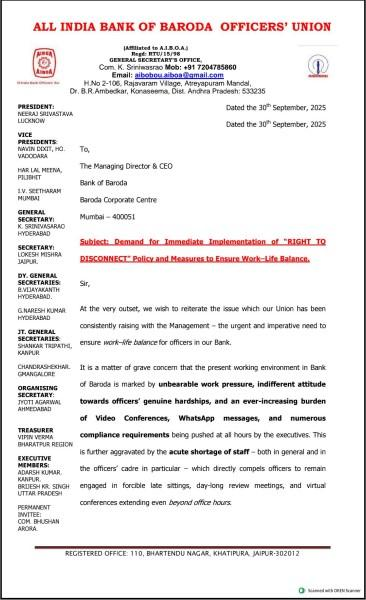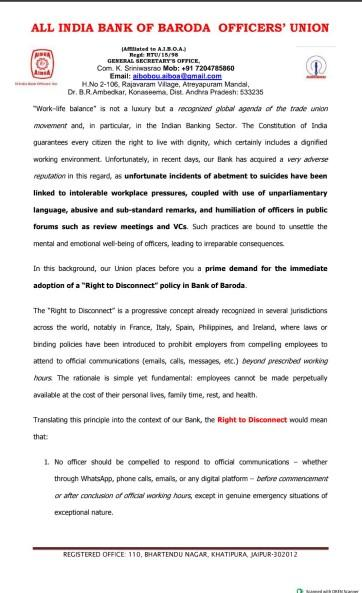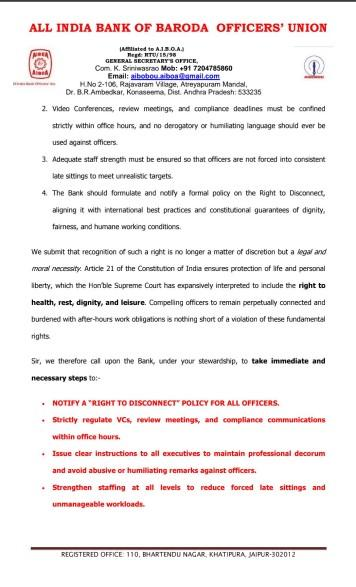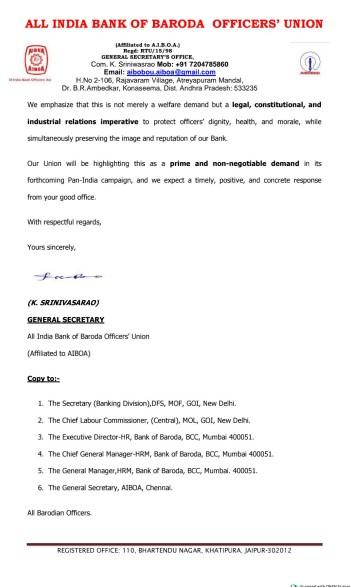All India Bank of Baroda Officers’ Union Demands 'Right to Disconnect' to Combat "Unbearable Work Pressure"
The Bank of Baroda Officers’ Union has demanded a “Right to Disconnect” policy to stop after-hours calls, messages, and meetings. They say constant pressure is harming health, family life, and dignity, and want the bank to act in line with global best practices.

Author: S Nila
Published: September 30, 2025
The All India Bank of Baroda Officers’ Union (AIBOBOU) has called for a new policy that would give employees the “Right to Disconnect”. In a letter sent on 30th September 2025 to the bank’s CEO and the Central Government, the union said that constant work pressure, lack of staff, and after-hours messages are harming officers’ mental health and even leading to suicides.

Advertisement


Advertisement
Image - Statement by AIBOBOU
Always Connected, Always Pressured
Bank officers are expected to respond to video calls, WhatsApp messages, emails, and compliance work at all hours. The union says this culture of being “always available” forces long hours and late-night meetings, leaving no time for rest or family. They stress that this has become a serious problem across the bank and is damaging its reputation.
The General Secretary of the union, K. Srinivasarao communicated to Kanal that several serious concerns stemming from the indiscriminate use of the messaging app for official communication.
Read more at All India Bank of Baroda Officers’ Union Demands 'Right to Disconnect' and End to 'Unwarranted Misuse' of WhatsApp
A Legal and Moral Issue
The union argues that the demand is not just about comfort but about rights. Under Article 21 of the Indian Constitution, every person has the right to life and personal liberty, which courts have said also includes rest, health, and dignity. Forcing staff to work after hours, the union says, goes against these rights.
What Other Countries Are Doing
The “Right to Disconnect” is already law in countries such as France, Spain, Italy, Ireland, and the Philippines. In these places, employers cannot force workers to reply to calls, emails, or messages after office hours. The union says India should follow these global examples and protect workers in the same way.
The Union’s Key Demands
The union has asked the bank to take four main steps:
- Bring in a Right to Disconnect Policy – No officer should be forced to answer calls, WhatsApp messages, or emails before or after working hours, unless it is an emergency.
- Control Meetings and Deadlines – Video conferences and compliance work should happen only in office hours.
- Ensure Respectful Behaviour – Senior staff should be told to maintain professional behaviour and avoid abusive language, which the union says has led to stress and even suicides.
- Increase Staff Numbers – Fill vacancies to reduce heavy workloads and stop forced late sittings.
Taking the Issue Higher
The union has also sent the letter to the Ministry of Finance and the Chief Labour Commissioner. By doing this, it shows it is ready to take the fight to a national level, making the issue not just about one bank but about the whole sector.
Possible Challenges
Union says that the bank’s management may argue that banking is an essential service and sometimes needs quick action even outside office hours. The real challenge will be to clearly define what counts as a “genuine emergency” so that officers are not misused in the name of urgency. Changing workplace culture will also take time and effort.
Bank of Baroda’s Choice: Reform or Conflict
The demand for the “Right to Disconnect” is a turning point for bank employees in India. It links work-life balance directly to constitutional rights and global best practice. If Bank of Baroda takes action, it could become a leader in protecting employees’ well-being and set an example for other companies. If not, the issue could grow into a bigger conflict across the banking industry.
In short, the union is saying that staff need dignity, health, and rest—and that banks must respect the limits of working hours in today’s digital world.
Advertisement
No comments yet.
